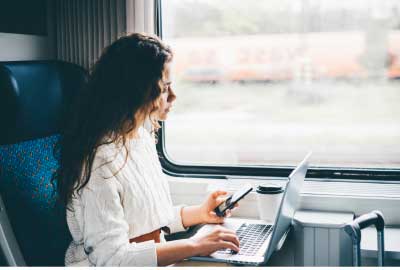Hey Travel Champions.
You let us know that you were very interested in learning more about safety & security, and we hope this article helps you fuse technology and customer service to help your travellers.
Through our years of experience serving our clients, we know that the relationship between companies and their travellers is changing, and we understand our travellers are your employees.
No crystal ball? No problem
You can predict and plan for what may lie ahead. With online advisories and your guidance to empower your travellers, they can make proactive and informed decisions before they go, and while on the move. Check out the below list to help avoid potentially dangerous or unproductive situations that may arise during travel:
Adverse Weather
Events such as floods, earthquakes and hurricanes can be more common than we believe in certain parts of the world. If severe weather is expected, it is even more important to have your travellers journey planned. Just a few minutes of checking information services before your traveller is due to leave can make all the difference to their trip. alternatively, if you arm your travellers with the myCWT app, they'll be kept up to date on weather warnings.
Civil Unrest
Political instability can affect travel plans and endanger travellers. Maybe you booked that trip months ago before that destination started making headlines for riots. What do you do now? Start by assessing the risk, and follow the travel advice of your government. Many countries offer travel advice by country, including safety and security, travel requirements, travel warnings, and health recommendations. If your traveller decides to still take their trip, make sure:
- They have a basic understanding of the political and security situation in your destination
- Ensure they are familiar with the city, most common types of crime, risky modes of transport, specific precautions for women or LGBTQ+ travellers, and any behaviours that may offend
- Understand the safety of public transport options
Unpredictable local laws
Remember that your travellers represent the company during the trip, so to avoid embarrassment, or worse, investigate local laws before your travellers risk breaching them for ignorance. For example, Dubai operates some tough rules around alcohol, so advise your traveller to proceed with caution, as it is illegal to drink or be under the influence of alcohol in public.
How to: prepare employees for international travel
If your business travellers move from one country to another, they will need to have access to key information at each stage of their trip. Ensure the safety of corporate travellers by ensuring that your employees take these points into account.
Travel Documents
Visas can have a significant cost and, it’s well-known that time is money, and sometimes getting the necessary documents can take a while. Worst case scenario, failing to obtain the required authorizations can result in an executive being rejected and sent back home! Fortunately, we partner with visa experts CIBT, who offer our customers discounts on visa services and an automated email advising when a visa is needed for the next trip. It also contains a link to the CIBT page to proceed with the request.
Business Customs
Knowing the local business etiquette can avoid many a blunder. Be sure to educate your travellers on important cultural differences. In Japan, the exchanging of business cards is treated with the utmost respect. If there was ever a time to splurge on a card carrying case, it would be before a trip to Japan.
Cultural Misunderstandings
Doing a little bit of research on the country your traveller is heading too is a great way to prep. To ensure your traveller feels comfortable and confident, share a little bit of research with them that they can review before hopping off the plane. Just knowing a few simple facts about the country and how daily life is lived can help with integrate into the workplace and culture more easily. As an example, did you know that in Singapore if you are in a hawker centre and you see a packet of tissues on an otherwise lean and empty table – it’s reserved! It’s common practice and once you notice it, you will see it everywhere!
Key Contact Information
Your travellers should know how to contact International SOS, local emergency services and anyone in the company who can help them in case of interruptions or other problems.
Tips for healthy travellers
If one of your employees becomes ill during their trip, they are unlikely to do their best at business meetings or do a good job. Although health problems cannot often be predicted, you can plan in advance how to manage them. These are some health-related considerations that must be taken into account while travelling:
The availability of healthcare
Did you know more than 10,000 travellers become ill with malaria each year? Make sure your travellers know where they can get medical support before they need it. International SOS provides medical, clinical and safety assistance worldwide and can advise on what to do with any health problem, 24 hours a day, 7 days a week.
Food and water security
Savouring the local cuisine in a new city is an undeniably exciting prospect for your travellers, but some parts of the world may not have the same hygiene standards as the country you’re travellers are leaving. Help your travellers reduce their risk of sickness by sharing with them a list of things they should know before they go – such as avoiding street food, or dishes such as salads, which may not have been washed or prepared properly in developing countries.
Threats to health and diseases
Stomach discomfort, altitude sickness and heat exposure are some of the most common medical issues your travellers are likely to encounter when travelling abroad. It is important to know what the right remedies are, especially those that are sold without a prescription, so investigate it beforehand.
It is also worth bearing in mind the risk profile of your travellers. As an example, harsh climates, or air pollution could be detrimental to people who suffer from breathing condition such as asthma, and easy access to medical facilities or medications such as an inhaler may be reduced in certain cities.
Let's get 'reel' about ground transport
With a cornucopia of travel options readily available for your travellers, they will be taking a range of different ground transportation methods during their trip. The greater the number of travel methods they use, the greater the risk they take. Ensure that your employees follow these safety tips for corporate travellers:
By car
Getting around the road is often the easiest and fastest way to get from one place to another, so if your travellers are allowed to drive in a different country, it is an option worth considering. Travellers will need to make sure they have their driving license with them at all times and should be careful to book with reputable car rental companies.
Some destinations may have very different driving rules, such as cars driving on the opposite side of the road, and your travellers can use their Great Britain (GB) or Northern Ireland driving licence in all EU or European Economic Area (EEA) countries, and Switzerland, during stays of up to 12 months. They may need an international driving permit (IDP) to drive outside the EU or EEA.
In some countries, you’ll only need to get a permit in certain situations. For example, if you’re hiring a car, or if you’ll be there for more than 30 days. If travelling through more than one country, you traveller might need more than one type of IDP. If unsure, you can check with the embassy of the country they’re travelling to, if you’re hiring a car, check with the car hire company.
Cab
If your travellers need a taxi, advise them on trusted local brands. If possible, book in advance for them instead of having them grab a cab on the street.
Public transport
The security levels of a destination vary greatly from one city to another, and even from one neighbourhood to another depending on the time of day. To ensure the safety of your corporate travellers, investigate public transportation options where they will be staying, and assess if a car with a driver would be a safer option.
Personal security
Sometimes business travellers focus so much on their meetings or conferences, they neglect to investigate crime levels, safety standards and neighbourhoods that they should be mindful to avoid. Without this key information, they may be more vulnerable to opportunists, with your help in the following areas they can remain vigilant and reduce the odds of becoming a victim of targeted crime:
Destination information
Whatever domestic problems a country faces, It is advisable to keep your travellers informed about its social, political, or economic developments of interest for the destinations on their itinerary. CWT Alerts provide concise information to travel bookers and travellers about incidents that may affect travel or threaten the safety and security of travellers.
- Each CWT Alerts provides concise information about an event or incident that may affect travel, increase travel security risk or pose a health threat. CWT Alerts assess and succinctly summarize the respective threat or incident to help subscribers quickly identify and monitor significant and relevant situations.
- Learn more about CWT Alerts here
Criminality and laws
Some destinations are known to be more hazardous. Find out what the most common crimes are in each city on your travellers' itinerary, and take measures to protect your travellers from them, either by organising an escort or by offering them a safe place to deposit their valuables. CWT monitors and evaluates major worldwide events 24/7 to give you added peace of mind when it comes to traveller care. When a serious incident likely involves or affects business travellers of our clients, we activate our crisis communication protocol to help you our clients react quickly and support any of your affected business travellers.
CWT monitors and evaluates major worldwide events 24/7 to give you added peace of mind when it comes to traveller care. When a serious incident likely involves or affects business travellers of our clients, we activate our crisis communication protocol to help you our clients react quickly and support any of your affected business travellers. You are also always connected and can stay in touch with your travellers no matter where they are. myCWT has push notifications and status updates, plus a live assistance feature if employees need to make or cancel a booking.
Security training
Organising or delivering travel security and risk management training programmes to address your travellers' specific needs can support your risk prevention goals, and help improve travellers’ personal safety measures.
Good preparation can make an enormous difference to the safety and security of your travellers. Hopefully, the information provided in this list will enable you to feel more prepared and at ease when you book a trip for your travellers.




